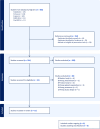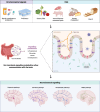Pharmaco-psychiatry and gut microbiome: a systematic review of effects of psychotropic drugs for bipolar disorder
- PMID: 40528728
- PMCID: PMC12282230
- DOI: 10.1099/mic.0.001568
Pharmaco-psychiatry and gut microbiome: a systematic review of effects of psychotropic drugs for bipolar disorder
Abstract
Despite being one of the most common and debilitating mood disorders, bipolar disorder is often misdiagnosed and undertreated. Its pathogenesis is complex, with significant patient variability and inconsistent treatment effectiveness. The brain-gut-microbiota axis plays a critical role in bipolar disorder by modulating neurotransmitter secretion, gut peptides and systemic inflammation. However, the mechanisms by which psychotropic treatments influence gut microbiota composition and their implications for clinical outcomes remain poorly understood. This systematic review evaluated the impact of psychotropic drugs on gut microbiota and their potential role in bipolar disorder treatment outcomes. A comprehensive search across Ovid MEDLINE, Embase, APA PsycINFO, Scopus and PubMed yielded 314 articles, of which 12 met the inclusion criteria (last search: 13 August 2024). The studies included were those on adults with bipolar disorder type I or II receiving psychopharmacological treatments; those with group comparisons (e.g. healthy controls vs. medicated vs. non-medicated) investigating gut microbiome changes; and no restrictions applied to psychotic features, comorbid anxiety or prior treatment responses. Exclusions involved individual case reports, incomplete conference submissions or early terminated studies lacking efficacy analysis. Cochrane ROBINS-I V2 tool was used to measure the risk of bias, and the GRADE approach was utilized to rate the certainty of evidence in included studies. Two authors independently extracted data into Excel spreadsheets, categorizing demographic and clinical characteristics, describing microbiome analytic methods and summarizing findings on gut microbiome changes post-treatment. Given the high variability in methods and outcome measures across studies, all details were reported without data conversion. Data synthesis reveals that psychotropic treatments, including quetiapine and lithium, influence gut microbiota by increasing the abundance of beneficial bacteria supporting gut health and pathogenic bacteria linked to metabolic dysfunction. Notably, female patients exhibited more significant changes in microbial diversity following psychotropic treatment. Additionally, patients treated with psychotropics showed an increased prevalence of gut bacteria associated with multidrug antibiotic resistance. In bipolar patients treated with quetiapine, responders - those experiencing improved depressive symptom scores - displayed distinct gut microbiome profiles more closely resembling those of healthy individuals compared with non-responders. Responders also exhibited neural connectivity patterns similar to healthy subjects. These findings underscore the complex dual impact of psychotropic medications on gut microbiota, with potential consequences for both gut and mental health. While the enrichment of beneficial bacteria may support gut health, the rise in antibiotic-resistant and metabolically disruptive bacteria is concerning. Study limitations include methodological heterogeneity, inclusions of other psychiatric disorders, a high risk of bias in some studies due to incomplete statistical analyses or insufficient control for confounding factors and potential duplication of study populations arising from overlapping authorship. Further research is essential to elucidate the functional consequences of these microbial shifts and their influence on treatment efficacy. Nevertheless, this review highlights the potential of utilizing gut microbiota profiles to inform personalized treatment strategies, optimize therapeutic outcomes and minimize side effects in bipolar disorder. This study was registered with Open Science Framework (https://doi.org/10.17605/OSF.IO/3GUZR).
Keywords: antipsychotics; bipolar disorder; gastrointestinal microbiota/microbiome; mood stabilizers; psychotropics.
Conflict of interest statement
The authors have no competing interests to declare.
Figures
Similar articles
-
The Black Book of Psychotropic Dosing and Monitoring.Psychopharmacol Bull. 2024 Jul 8;54(3):8-59. Psychopharmacol Bull. 2024. PMID: 38993656 Free PMC article. Review.
-
Atypical antipsychotics for disruptive behaviour disorders in children and youths.Cochrane Database Syst Rev. 2012 Sep 12;(9):CD008559. doi: 10.1002/14651858.CD008559.pub2. Cochrane Database Syst Rev. 2012. Update in: Cochrane Database Syst Rev. 2017 Aug 09;8:CD008559. doi: 10.1002/14651858.CD008559.pub3. PMID: 22972123 Updated.
-
Ketamine and other glutamate receptor modulators for depression in adults with bipolar disorder.Cochrane Database Syst Rev. 2021 Oct 8;10(10):CD011611. doi: 10.1002/14651858.CD011611.pub3. Cochrane Database Syst Rev. 2021. PMID: 34623633 Free PMC article.
-
Systemic pharmacological treatments for chronic plaque psoriasis: a network meta-analysis.Cochrane Database Syst Rev. 2021 Apr 19;4(4):CD011535. doi: 10.1002/14651858.CD011535.pub4. Cochrane Database Syst Rev. 2021. Update in: Cochrane Database Syst Rev. 2022 May 23;5:CD011535. doi: 10.1002/14651858.CD011535.pub5. PMID: 33871055 Free PMC article. Updated.
-
Pramipexole in addition to mood stabilisers for treatment-resistant bipolar depression: the PAX-BD randomised double-blind placebo-controlled trial.Health Technol Assess. 2025 May;29(21):1-216. doi: 10.3310/HBFC1953. Health Technol Assess. 2025. PMID: 40455248 Free PMC article. Clinical Trial.
Cited by
-
Epigenetics and Gut Microbiota in the Pathogenesis and Treatment of Bipolar Disorder (BD).Cells. 2025 Jul 18;14(14):1104. doi: 10.3390/cells14141104. Cells. 2025. PMID: 40710357 Free PMC article. Review.
-
Association of psychosis and oral health: case-control study.Clin Oral Investig. 2025 Aug 6;29(9):397. doi: 10.1007/s00784-025-06463-6. Clin Oral Investig. 2025. PMID: 40764865 Free PMC article.
References
-
- Schmidt C, Stallmach A. Etiology and pathogenesis of inflammatory bowel disease. Minerva Gastroenterol Dietol. 2005;51:127–145. - PubMed
Publication types
MeSH terms
Substances
LinkOut - more resources
Full Text Sources
Medical
Miscellaneous




